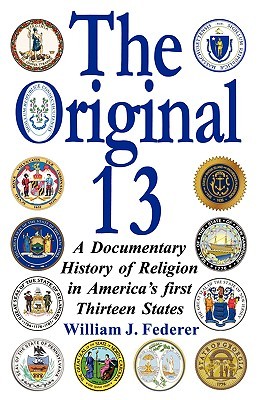
- We will send in 10–14 business days.
- Author: William J Federer
- Publisher: Amerisearch, Inc.
- ISBN-10: 0977808521
- ISBN-13: 9780977808526
- Format: 15.4 x 21.6 x 2.5 cm, minkšti viršeliai
- Language: English
- SAVE -10% with code: EXTRA
Reviews
Description
"The whole power over the subject of religion is left exclusively to the State governments, to be acted upon according to their justice and the State Constitutions," wrote Supreme Court Justice Joseph Story in his Commentaries on the Constitution of the United States, 1833. Who was Joseph Story? He was the founder of Harvard Law School and appointed to the Supreme Court by President James Madison - the same James Madison who introduced the First Amendment in the first session of Congress. To understand the progression of religious freedom in America, it is necessary to review the Constitutions of the original thirteen States, together with the Colonial Charters that preceded them, i.e.: VIRGINIA CHARTER OF KING JAMES I, 1606 "...propagating of Christian Religion to such People as yet live in Darkness..." DELAWARE CHARTER OF KING ADOLPHUS, 1626 "...further propagation of the Holy Gospel..." MASSACHUSETTS CONSTITUTION, 1780, Part 1, Article 3 "Every denomination of Christians...shall be equally under the protection of the law and no subordination of any one sect or denomination to another shall ever be established..." PENNSYLVANIA CONSTITUTION, 1968, Article 1, Section 3 "All men have a natural and indefeasible right to worship Almighty God according to the dictates of their own consciences..." NORTH CAROLINA CONSTITUTION, 1971, Article 11, Section 4 "Beneficent provision for the poor, the unfortunate, and the orphan is one of the first duties of a civilized and a Christian state..." Examining Charters, Constitutions, Court Decisions and Correspondence, this overview of history is intended as a study help for those interested in discovering the role religion played in America's original thirteen States. The process of how the Federal Courts removed religion from States' jurisdiction, most notably in the 1947 Everson v. Board of Education case, and subsequently evolved it into its present interpretation is the subject of another book.
EXTRA 10 % discount with code: EXTRA
The promotion ends in 21d.03:59:03
The discount code is valid when purchasing from 10 €. Discounts do not stack.
- Author: William J Federer
- Publisher: Amerisearch, Inc.
- ISBN-10: 0977808521
- ISBN-13: 9780977808526
- Format: 15.4 x 21.6 x 2.5 cm, minkšti viršeliai
- Language: English English
"The whole power over the subject of religion is left exclusively to the State governments, to be acted upon according to their justice and the State Constitutions," wrote Supreme Court Justice Joseph Story in his Commentaries on the Constitution of the United States, 1833. Who was Joseph Story? He was the founder of Harvard Law School and appointed to the Supreme Court by President James Madison - the same James Madison who introduced the First Amendment in the first session of Congress. To understand the progression of religious freedom in America, it is necessary to review the Constitutions of the original thirteen States, together with the Colonial Charters that preceded them, i.e.: VIRGINIA CHARTER OF KING JAMES I, 1606 "...propagating of Christian Religion to such People as yet live in Darkness..." DELAWARE CHARTER OF KING ADOLPHUS, 1626 "...further propagation of the Holy Gospel..." MASSACHUSETTS CONSTITUTION, 1780, Part 1, Article 3 "Every denomination of Christians...shall be equally under the protection of the law and no subordination of any one sect or denomination to another shall ever be established..." PENNSYLVANIA CONSTITUTION, 1968, Article 1, Section 3 "All men have a natural and indefeasible right to worship Almighty God according to the dictates of their own consciences..." NORTH CAROLINA CONSTITUTION, 1971, Article 11, Section 4 "Beneficent provision for the poor, the unfortunate, and the orphan is one of the first duties of a civilized and a Christian state..." Examining Charters, Constitutions, Court Decisions and Correspondence, this overview of history is intended as a study help for those interested in discovering the role religion played in America's original thirteen States. The process of how the Federal Courts removed religion from States' jurisdiction, most notably in the 1947 Everson v. Board of Education case, and subsequently evolved it into its present interpretation is the subject of another book.


Reviews